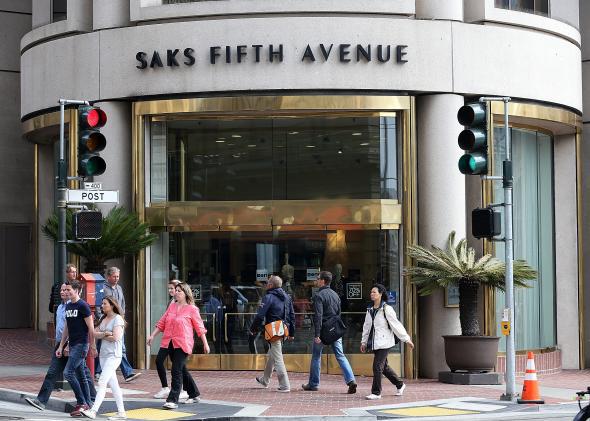On Tuesday, the chief executive of Saks Fifth Avenue’s parent company effectively doubled down on Saks’ claim that it has a legal right to discriminate against, harass, and fire trans employees simply for being trans. At the same time, the chief executive asserted that “it’s preposterous to think that in any way Saks Fifth Avenue is anything but a strong advocate for LGBT rights.” The company will thus continue to fight trans discrimination lawsuits by claiming that trans employees have no legal protection against workplace harassment.
A bit of background here: In December, Saks sought to dismiss a sex discrimination lawsuit filed by a former employee, Leyth O. Jamal, who claims she was harassed, then fired, for being a trans woman. Rather than fighting the allegations, Saks merely insisted that it is legally permitted to discriminate against trans workers, and so Jamal’s lawsuit should be dismissed out of hand. Adding insult to injury, Saks’ attorneys referred to Jamal as a male throughout their filings—and, when quoting Jamal’s own complaint, they added a “[sic]” after every reference to Jamal as female, as if to aver that her identification as a woman is factually wrong.
To be fair, there is some controversy over the relevant law here. Title VII of the Civil Rights Act of 1964 forbids employment discrimination based on sex, and the Supreme Court has interpreted this provision to include discrimination based on irrational sex stereotyping. The Equal Employment Opportunity Commission, the Department and Justice, and several circuit courts have concluded that sex stereotyping includes anti-trans discrimination—and though the Supreme Court has yet to confirm this interpretation, the law is clearly moving in that direction. However, Saks is ignoring this trend altogether, instead proclaiming that “it is well settled that transsexuals are not protected by Title VII,” and on Tuesday affirming that they will use the lack of final SCOTUS or legislative guidance on the question to advance their case.
Reasonable people can disagree about the scope of Title VII’s sex discrimination provision. But Saks’ arguments here are troubling for two reasons. First, the company could have argued that it did not discriminate against Jamal, leaving larger questions about Title VII aside. If it’s true that Saks’ employees did not mistreat Jamal, this argument would be easy to make. The fact that Saks felt compelled to assert a broad legal right to discriminate against trans employees suggests the company was nervous that it might lose the case on the merits—in other words, that its employees actually did discriminate against Jamal.
Second, and more importantly, Saks’ legal strategy here is incredibly dangerous for the LGBT community. Should the Supreme Court agree that Saks has a right to discriminate against trans employees under Title VII, the trans community would be devastated. Decades of progress in securing legal rights for trans people would be instantly reversed, and trans employees in dozens of states would suddenly lose their only legal protections against workplace discrimination and harassment. The fact that Saks is willing to risk this calamity suggests it is not quite the “strong advocate for LGBT rights” that it claims to be.
Until now, Saks could have claimed—however dubiously—that its motions against Jamal did not represent the views of the company’s leadership, and apologized for the debacle. Instead, Saks has stood its ground, refusing to rescind even its insistence that Jamal’s identification as a woman is a fiction. In a recent interview with BuzzFeed, the company said it “maintains a long history of policies and practices that are fully supportive of the LGBT community and our LGBT Associates.” Those are pretty words to put in a PR campaign. But when the chips are down, it’s painfully clear that Saks doesn’t mind demeaning the entire trans community if it saves them a little money.
